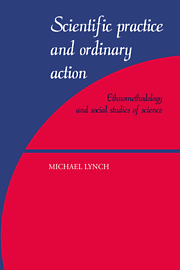Book contents
- Frontmatter
- Contents
- Acknowledgments
- Introduction
- 1 Ethnomethodology
- 2 The demise of the “old” sociology of science
- 3 The rise of the new sociology of scientific knowledge
- 4 Phenomenology and protoethnomethodology
- 5 Wittgenstein, rules, and epistemology's topics
- 6 Molecular sociology
- 7 From quiddity to haecceity: ethnomethodological studies of work
- Conclusion
- Name index
- Subject index
7 - From quiddity to haecceity: ethnomethodological studies of work
Published online by Cambridge University Press: 03 December 2009
- Frontmatter
- Contents
- Acknowledgments
- Introduction
- 1 Ethnomethodology
- 2 The demise of the “old” sociology of science
- 3 The rise of the new sociology of scientific knowledge
- 4 Phenomenology and protoethnomethodology
- 5 Wittgenstein, rules, and epistemology's topics
- 6 Molecular sociology
- 7 From quiddity to haecceity: ethnomethodological studies of work
- Conclusion
- Name index
- Subject index
Summary
Ethnomethodologists emphasize that the stable, constraining, recognizable, rational, and orderly properties of “social facts” are local accomplishments, whereas sociologists of scientific knowledge claim that “natural facts” are social constructions. Investigators in both fields try to show how taken-for-granted facts arise from concerted human activities, and they explicitly turn away from the idea that facts are manifestations of a transcendent natural order demonstrated through a rational method of inquiry. In a way, both ethnomethodology and the sociology of scientific knowledge are part of what Stanley Fish calls the “intellectual left” opposition to philosophical essentialism. Both insist that
the present arrangement of things - including, in addition to the lines of power and influence, the categories of knowledge with their attendant specification or factuality or truth - is not natural or given, but is conventional and has been instituted by the operation of historical and political (in the sense of interested) forces, even though it now wears the face of “common sense.”
Among the members of the intellectual left, Fish lists “Marx, Vico, Foucault, Derrida, Barthes, Althusser, Gramsci, Jameson, Weber, Durkheim, Schutz, Kuhn, Hanson, Goffman, Rorty, Putnam, and Wittgenstein, and their common rallying cry would be ‘back (or forward) to history.’”
- Type
- Chapter
- Information
- Scientific Practice and Ordinary ActionEthnomethodology and Social Studies of Science, pp. 265 - 308Publisher: Cambridge University PressPrint publication year: 1994
- 2
- Cited by

